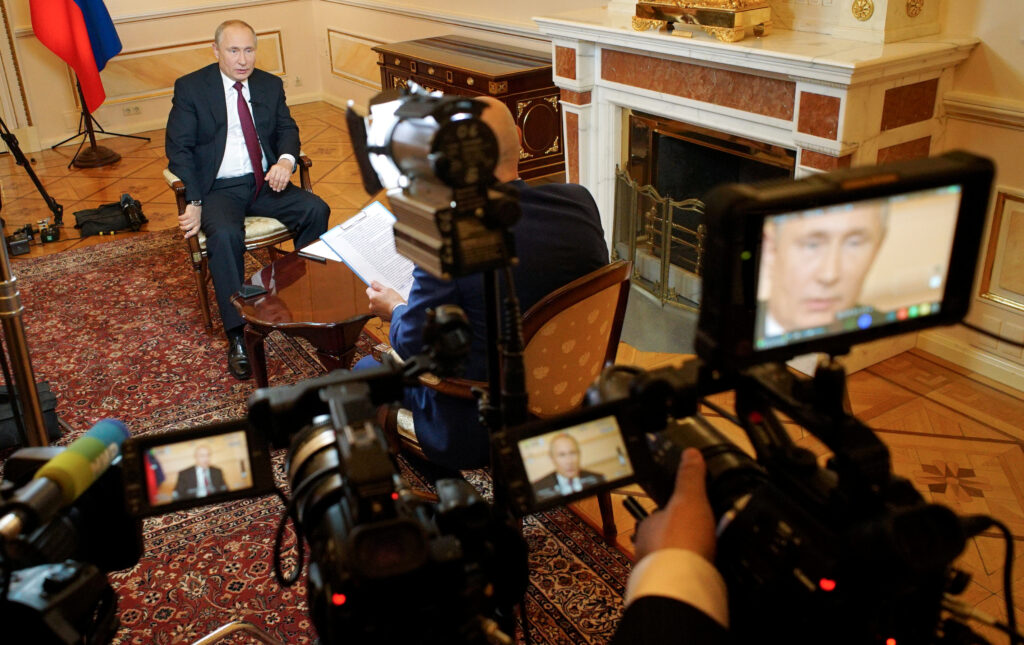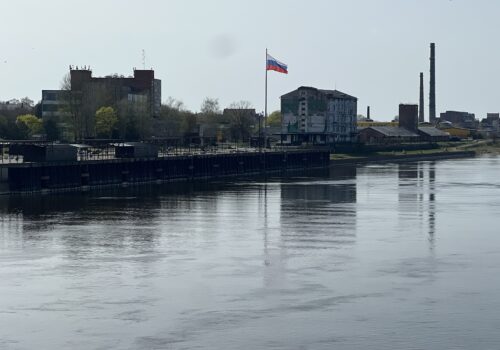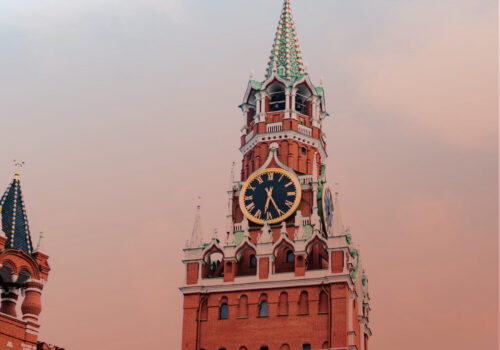This project, a collaboration between the Atlantic Council’s Transatlantic Security Initiative and the Latvia-based Centre for East European Policy Studies, aims to advance understanding of Latvia’s defense and security policies, with an emphasis on resilience-building strategies. Latvia’s measures offer lessons for other frontline states, and demonstrate an increasing willingness to prioritize defense in an uncertain geopolitical environment. Read the other articles in this series here and here.
For more than a decade, Russia has carried out information-manipulation campaigns aimed at polarizing society and undermining democracy among its neighbors and other countries in Europe. These manipulation efforts have only intensified following Russia’s full-scale invasion of Ukraine in 2022. For targets of these campaigns, such as Latvia, the resilience of the country’s information space has become a national-security priority.
In response to Russia’s actions, Latvia is developing practical tools across government, civil society, and the media to expose and counter disinformation and other tactics. It has, for example, formally recognized the information space as a domain of national defense in its National Defense Concept since 2016. Protecting an open, resilient media environment now stands alongside the pillars of military and civil preparedness in Latvia’s security strategy.
Latvia is acutely vulnerable to Kremlin-backed information influence activities due to historical ties and its large Russian-speaking minority. At the same time, Moscow’s manipulation of information is not just aimed at individual countries. There is also a broader underlying target—Western society—and Russia repurposes the methods it employs in Latvia elsewhere in the world.
To address this wider Russian threat, Latvia is sharing what it is learning with its allies and partners. It hosts NATO’s Strategic Communications Center of Excellence, and it works with allies and partners to combat malign influence. Examples of this kind of cooperation are IREX (International Research and Exchanges Board), which conducts media training in the Baltics, and the Atlantic Council’s Digital Forensic Research Lab, which investigates disinformation and debunks narratives, educates media consumers, and has had staff based in Latvia since 2017.
Russian information influence threats in Latvia’s media space
Zeroing in on manipulation campaigns in Latvia, Russia appears to have several goals: It wants to provoke and sustain disagreements and discord within both the transatlantic community and Latvian society. It wants to discredit Ukraine and its statehood. And it wants to polarize, disinform, and multiply doubts about local and Western politics and state institutions.
Russia has strengthened its information influence tactics over the years, transforming traditional tactics into complex campaigns that now perform across multiple domains simultaneously. Since the beginning of its full-scale invasion of Ukraine, Russia’s information-manipulation activities have increased in intensity and aggressiveness, using a varied spectrum of information resources to ensure the dissemination of its desired narratives.
Russian influence operations are well-funded and adapt quickly. Until 2022, Russian state TV and radio channels dominated Latvia’s media, outmatching local Russian-language content. After Latvia banned dozens of Russian state media outlets following Moscow’s invasion of Ukraine, the propaganda efforts shifted online. Kremlin narratives now spread via social media platforms such as YouTube, TikTok, and Telegram, and they are often amplified by bots, trolls, and proxy websites. Common themes distributed on these channels include portraying Latvia’s government as illegitimate and “Russophobic,” rewriting history to romanticize Soviet times, and framing NATO and the European Union (EU) as enemies.
Cases of Russian disinformation in Latvia have risen despite efforts to control the spread of Kremlin-generated narratives. Moreover, the increasing use of artificial intelligence is allowing information manipulators to become more efficient and making detection of their efforts that much harder. In addition, the Latvian population in the border areas are still subjected to comprehensive Russian information manipulation activities via analogue broadcasting, which is available in certain regions. Approximately 20 percent of Latvia’s Russian-speaking viewers still access banned Russian state TV channels through virtual private networks (VPN). This poses a threat in the event of Russian kinetic maneuvers, as it could reduce resistance and resilience.
How Latvia is countering information influence
Latvia’s response has been to treat the information space as a critical front, viewing defense against lies and propaganda as vital as physical defense. Under its comprehensive defense strategy, the government has designated a resilient information environment as a shared responsibility of the state and society.
Public awareness and education are central to this effort. Media literacy training is built into school curricula and community programs. The government has fostered a “culture of readiness” through regular information campaigns and hands-on materials with tips to spot falsehoods. The state has also bolstered strategic communication resources and independent media. A dedicated strategic communications unit under the State Chancellery coordinates messaging across ministries and works with social-media companies to curb fake news. Quality journalism is supported by funding and policy. Authorities have also not hesitated to ban harmful outlets. Dozens of Russian propaganda channels were taken off-air or have been penalized. In 2021, Latvia became the first Baltic state to prosecute individuals for willfully spreading dangerous falsehoods, as per the Criminal Law, though there have been few convictions due to legal ambiguity around the definition of “fake news” in Article 231. There are ongoing attempts to reword parts of the law to mention false content or disinformation explicitly.
Latvia’s multi-layered approach extends beyond government. An ecosystem of nongovernmental organizations, academics, and volunteers (such as the “Baltic Elves”) actively debunk online falsehoods and track malign campaigns. Investigative journalists and fact-checkers expose disinformation trends, while initiatives such as the Baltic Centre for Media Excellence train reporters and promote high standards in journalism. At the same time, advanced monitoring tools help detect and attribute new tactics—from bot networks to deepfakes—in collaboration with NATO’s Strategic Communications Center and other partners. Crucially, Latvia strives to balance security with free expression. Maintaining an open and resilient information environment is considered crucial to national endurance in crises.
Latvia’s strategy has its limitations. Its main approach has been one of blocking malign narratives rather than proactively projecting its own strategic messages. The planned discontinuation of funding for Russian-language content on the public broadcast from next year contradicts the policy of recognizing the need to invest in alternatives to Russia’s information space, especially for minorities and older Russian-speakers less comfortable online. This could push approximately a fifth of Latvia’s Russian-speakers further into the Kremlin’s info-sphere. The experiment of welcoming Russian independent media has had mixed results. These outlets primarily focus on audiences in Russia and Latvian policymakers have placed few expectations on them for working within the Latvian information space. Thus, sustaining quality Russian-language media content remains a challenge. Furthermore, years of low financing for media, especially public media, in earlier years has been attributed as a root cause of the current information vulnerability.
The roles of partners and allies
Although the Baltic states are often considered to have the broadest experience within NATO in dealing with Russia’s influence campaigns and activities, the Kremlin has also targeted other allies with information manipulation. Latvia’s experience has contributed to broader transatlantic defense efforts on this challenge, generating support from the United States in setting up media-resilience programs and coordinating closely on counterpropaganda efforts. Latvia’s advocacy helped push NATO to treat disinformation as a core security issue. For example, NATO exercises in the Baltics now include simulated information-warfare scenarios, and the Alliance has fielded counterhybrid support teams that can deploy to allies under attack.
However, success depends heavily on continued support from major partners such as the United States. There are concerns that the United States could step back from efforts to counter foreign disinformation, which some US policymakers have framed as a “censorship industrial complex.” This could leave allies exposed and weaken collective resolve, particularly impacting European nations heavily targeted by Russian influence operations. There is also a risk that in the absence of firm US leadership, European counterparts may follow suit, potentially undermining the credibility and resilience of liberal democracies. Furthermore, Russia does not appear constricted by political, ethical, moral, or legal considerations, making its abilities more flexible, broad, and therefore harder to counter in any democratic society built on free-speech principles. Thus, sustaining international cooperation and collective defense is crucial.
The EU has also begun to recalibrate. In April of this year, the European Commission unveiled ProtectEU, a strategy aimed at reinforcing the bloc’s ability to anticipate, prevent, and respond to hybrid threats, acknowledging the blurred line between hybrid interference and warfare, particularly citing Russia’s campaigns. The Commission is proposing to expand the powers of EU law enforcement agencies to tackle such threats more effectively, signaling a more integrated approach. The EU Digital Service Act also helps regulate large platforms and the spread of disinformation. For ProtectEU to succeed, member states need coordination, integration, and the political will to overcome frictions around data sharing and sovereignty. If the United States pulls back from the continent, Europe has an opportunity to step forward, potentially becoming the vanguard in defending democratic values.
Where to start
To effectively counter information manipulation in this evolving threat landscape, policymakers in targeted countries should adopt a multi-pronged approach drawing on steps Latvia has taken.
Latvia’s experience demonstrates that even a small democracy can bolster its media space. By combining policy tools, public education, media support, active debunking, and international partnerships, Latvia built a layered defense. The fight is a marathon, not a sprint, requiring agility and continuous refinement of strategies. Unity is key. Collective resilience is achievable when nations pool knowledge and stand firm. Latvia’s example shows that with proactive measures, societies can strengthen their “information immune system” and fortify democracy against propaganda and lies.
One of the lessons from the Baltics, and especially the Latvian experience, is that strengthening the national counterdisinformation framework and building resilience are crucial. This involves treating the information domain as a formal element of national security with clear leadership allocation and integrated policies. Educating the public in media literacy creates a resilient society over time, resulting in a populace less likely to be duped by fake news and minimizing the impact of influence activities. Regularly reviewing and updating laws and regulations helps address modern manipulation techniques. Explicitly defining disinformation-related offenses empowers law enforcement to act in egregious cases without imposing broad censorship. Individual countries can also empower media regulators to take action against channels facilitating foreign influence.
Countries looking to foster a robust and independent information ecosystem need to support reliable information sources and actively counter falsehoods. Governments and citizens need to support independent and local media, including minority-language content, which provides credible alternatives and acts as a bulwark against external propaganda, filling gaps hostile actors might exploit. Governments can partner with private companies (social media platforms, for example) and media organizations to improve resilience and facilitate the flagging and removal of malicious content. Countries can also leverage nongovernmental organizations to allow for faster debunking within communities, often with greater trust. Using innovative forms of communication like art, stand-up, and gamification can reach audiences unresponsive to traditional media.
Working with allies multiplies the effectiveness of what individual states are doing. Actively participating in international coalitions and working toward common standards, such as joint incident response protocols, ensures a unified response and prevents adversaries from exploiting gaps or moving operations next door.
Even as this work progresses, important challenges persist. Democratic countries must counter influence within political, ethical, moral, and legal constraints, while adversaries often operate without such limits. The main task is avoiding the restriction of public debate while still countering malign influence. As with other Western democracies, Latvia’s main strategy has been blocking disinformation, but proactive narrative projection is lacking. Relying so much on reactive policies gives Russia and other sources of information manipulation a large advantage.
Elīna Vrobļevska is a researcher at the Center for East European policy studies and lecturer and researcher at Rīga Stradiņš University. Her primary research focuses on Russian foreign policy and narrative construction in the public sphere.
Beniamino Irdi is a nonresident senior fellow with the Atlantic Council’s Transatlantic Security Initiative within the Scowcroft Center for Strategy and Security. Previously, Irdi served within the Italian government in various capacities related to foreign affairs and security policy, including as a special adviser to Italy’s minister of foreign affairs.
This article is part of a series in partnership between the Atlantic Council and the Centre for East European Policy Studies.
Further reading
Thu, Apr 24, 2025
Dispatch from the Kaliningrad border: Russia is fighting a long battle of attrition with the West
New Atlanticist By Tressa Guenov
Russia has repeatedly shown itself to be a threat to its neighbors and hostile to their ambitions for closer ties with the United States and the rest of Europe.
Fri, Feb 2, 2024
Russia Tomorrow: Five scenarios for Russia’s future
Russia Tomorrow By
A new Atlantic Council report explores five paths that Russia future might take in its future. What forces will shape Russia’s future?
Wed, Jan 8, 2025
Sanctioned kleptocracy: How Putin’s kremligarchs have survived the war—and even prospered
Russia Tomorrow By
The latest report in the Atlantic Council’s Russia Tomorrow series explores how Russia’s kleptocratic networks infiltrated the West and measures the US and Europe can take to combat the malign influence of Russian kleptocracy around the globe.
Image: Russian President Vladimir Putin gives an interview to the Mir TV channel ahead of his visit to Kyrgyzstan to participate in the Shanghai Cooperation Organisation (SCO) summit, in Moscow, Russia June 13, 2019. Sputnik/Alexei Druzhinin/Kremlin via REUTERS




